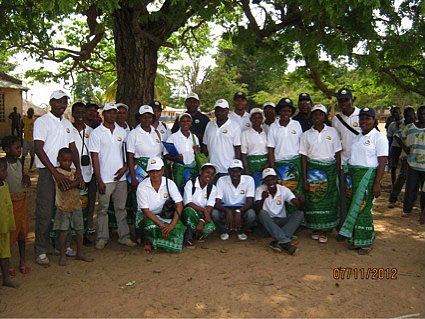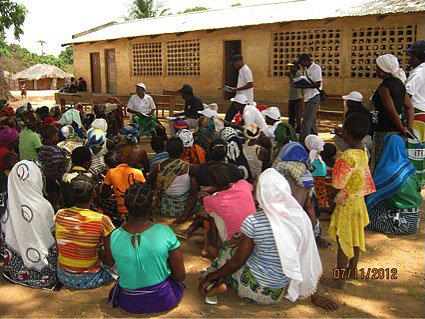
The issue of land rights and natural resource management in Mozambique is a challenge affecting millions of people. A recent study indicates that women in these areas experience only limited access to and control over their land and natural resources, compared to men, and are often excluded from decision making.
Gender and diversity play a key role in defining who uses, has access to and who controls natural resources, and ultimately who benefits. Addressing gender and diversity issues within communities helps to identify opportunities and constraints for individuals and groups in securing their livelihoods.
Since 2006, the Natural Resources Institute (NRI) has been providing management and technical support for the Mozambique Community Land Initiatives (known in Portuguese as Iniciativa para Terras Comunitárias or ITC), a multi donor/government and civil society partnership programme operating in eight provinces in Mozambique.
The objective of ITC is to secure land tenure and natural resource rights on behalf of local communities, to enhance their capacity for sustainable land use and to prevent and resolve land and natural resource conflict, in order to achieve poverty reduction and economic growth. They are committed to integrating gender and diversity in the implementation of their projects.
ITC's Community Land Use Fund, supports the implementation of community-based land and natural resource tenure security and development projects. NRI plays an important strategic and practical role, and provides support on gender and community engagement.
As part of this support, NRI conducted a Gender and Diversity Audit of the ITC programme and its participating communities and service providers in 2009. The study found that women experienced limited access to and control over land and natural resources, and lacked knowledge of their rights to these resources. Women were often excluded from household and community decision-making in resource management in both matrilineal and patrilineal communities.
Men also experienced severe constraints related to land and natural resources, with the increase of environmental degradation, land conflicts, and lack of economic opportunities. Other groups, such as youth, elderly, people with HIV/AIDS and orphans, were constrained by their marginal or poor quality land, with negative effects for their livelihoods and wellbeing.
 Most recently, NRI designed and supported the ITC's Cascade Gender and Diversity Capacity Building Programme, targeted at improving community engagement methods, promoting positive impact for women, girls and vulnerable groups, and developing local solutions to gender and diversity issues. Training was successfully given in 4 provinces so far, to build the capacity of key ITC partners to train other partners, including local government and community-based organisations. This 'Training of Trainers' model is designed to build long-term, sustainable capacity in Mozambican institutions.
Most recently, NRI designed and supported the ITC's Cascade Gender and Diversity Capacity Building Programme, targeted at improving community engagement methods, promoting positive impact for women, girls and vulnerable groups, and developing local solutions to gender and diversity issues. Training was successfully given in 4 provinces so far, to build the capacity of key ITC partners to train other partners, including local government and community-based organisations. This 'Training of Trainers' model is designed to build long-term, sustainable capacity in Mozambican institutions.
Following the initial training, NRI will work with the local ITC gender consultants to monitor the outcomes and identify how best to integrate gender training into broader capacity building for inclusive and sustainable rural development projects in Mozambique.
ITC's donors are working to develop a sustainable, independent national institution to succeed the ITC's present donor project model when the project ends in March 2014. NRI's technical assistance on gender will form a key part of a synthesis of operational and policy lessons from 8 years of practical engagement. The aim is to consolidate a strong framework for the new institution to expand and continue its coverage of rural communities throughout the country.
ITC is currently managed by a consortium comprising of KPMG, NRI and Mozambican environmental NGO Centro Terra Viva. It is working in Gaza, Manica, Cabo Delgado, Tete and Sofala provinces with finance from a group of European donors, coordinated by the Netherlands and contracted through DFID. Nampula, Niassa and Zambezia provinces fall under a parallel project financed by the US Millennium Challenge Corporation (MCC).
Photo credit: Catarina Chidiamassamba

